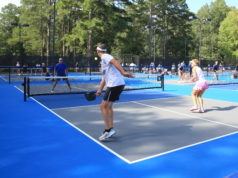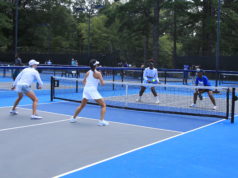By Page Love, MS, RD, CSSD, and Remy Coltek, Dietetic Intern
So it is that time of year again…thinking about getting that training diet in shape for the New Year. To build on previous nutrition articles, we have provided an updated list of key sport nutrition reminders with a sport-intuitive approach to fueling to help you develop those healthy habits to peak with your tennis performance. As you are coming off some possible holiday over-eating, consider starting with tuning in to your body’s needs more directly with the following tips:
 Post-holiday hunger cues
Post-holiday hunger cues
With the holiday times packed with gatherings, busy shopping days, and change of scheduled meal consistency, it is easy to feel lost with hunger cues. Not listening to natural hunger cues can cause us to eat more than the body needs. The hunger scale system can help you learn how to distinguish the difference between true physical hunger and emotional hunger initiated by stress, boredom, happiness or celebration, or sadness. The hunger scale ranges from 1-10, with the lower end feeling starving, weak, or dizzy and the higher end feeling so full you feel sick.
The goal is to fuel yourself when your hunger cues are within the 3-4 range and not waiting to eat until you get down to the 1-2 range when blood sugar is lower and you may make fewer healthy choices. Waiting until feeling irritable with low energy can lead to eating more than your body needs and not making the best sport nutrition fueling choices. When eating, it is important to stop and think about how hungry you are and where you gauge on the scale to make mindful effort of when to stop. A guideline is to stop when you no longer feel hungry nor full, but satisfied, or a little full feeling (a 6-7 on the hunger scale), which would also be a good place to stop in pre-fueling for your tennis matches.
Fad diets, such as intermittent fasting, can cause long periods without fueling the body and lead to ignoring natural hunger cues — not ideal for the weekend warrior tennis athlete! It is a great idea to plan to eat something at least every 3-4 hours to stay fueled, especially before and after your training. Finding that happy medium on the hunger scale will be beneficial to fueling your body adequately. Consider this guide as your new approach to fueling in the New Year.
 Intuitive Hydration
Intuitive Hydration
Hydration is so important on and off the court! Staying hydrated plays a role in overall performance, injury prevention, and recovery for athletes. Strive to consume at least 1 cup of hydrating fluids per hour by drinking water, sport beverages, decaffeinated tea or coffee, and eating soups or hydrating fruit like melon or cucumbers. Another great way to stay hydrated before and during play time is by adding Liquid IV or Nuun to your water to increase electrolytes and hydration. An easy way to tell if you are adequately hydrated is by looking at urine color — is it medium-dark yellow? If so, it is past time to hydrate, so grab a couple glasses of water! Aim for light-yellow urine as this indicates adequate hydration; but not clear, as clear urine is a sign of overhydration which can be dangerous. Additionally, over the holidays, alcohol consumption comes into play for many and it is important to curb intake and choose better hydrating options that will set you up for success on the court! Consider those NA beers as better post-match hydration choices!
Jumpstart your training diet
New Year’s healthy eating goals can be beneficial for training performance. One favorable diet for training is the Mediterranean-style diet, one of the few research-supported eating approaches for overall health, disease prevention, and also high energy fueling! The Mediterranean diet is more of a lifestyle approach to eating that promotes high-quality and higher fiber carbohydrates and whole grains, lean meats and fish high in omega 3’s, legumes, fresh fruits and veggies…all great ideas for fueling and recovery for tennis athletes!
Some advantages of the Mediterranean diet include varied food choices that are attainable; increased antioxidant intake with anti-inflammatory benefits, sparking the metabolism; and improved healing and strength of muscles with lean protein.
Pre-fuel and prepare for the court
Part of upping your game is ensuring you are pre-fueled and ready to go beforehand. Having adequate and appropriate complex carbohydrate intake prior to a match is imperative for peak performance! Pre-match meals should be 2-3 hours before matches and should be easy to digest complex carbs mentioned above, such as oatmeal or bagel for breakfast or rice, potato, and/ or pasta if later in the day! One- to two-cup volume of the complex carbohydrate food in a meal taking up ½ of your plate volume should be consumed along with a lean protein source like a poached egg or grilled chicken breast or lean meat sauce and a small amount of cooked vegetable or fruit choice (each of these components taking up ¼ of your plate). Then, a pre-match snack to consider can be a quick option such as Skratch bars or Skout bars that are packed with real, non-GMO ingredients like peanuts, coconut, quinoa, berries, and oats. Packing bars in your racquet bag prepares you for your game by topping off your hunger on the go.
Recover and rebuild your muscles
Post-fueling your body is equally as important as pre-fueling. However, the choices should proportionally be higher in protein within 15-30 minutes to rebuild the muscles that have just been used on the court! Respond to your hunger cues quickly and try a higher protein recovery snack such as a Clif Builder bar or Onwyn vegan plant-based protein shake. And don’t forget chocolate milk — always an appropriate choice, even a vegan alternative such as Ripple chocolate milk or Silk Protein almond milk! After a snack, don’t forget to follow up with a healthy high-protein, high-complex-carbohydrate meal such as Mediterranean-inspired quinoa bowl with roasted salmon, tzatziki sauce with Greek yogurt, assorted fresh veggies, and feta cheese!
Page Love is an avid ALTA participant and sport dietitian/nutrition advisor for the WTA and ATP professional tours. She has served on the USTA sport science committee for 25 years and has a private practice in Sandy Springs. You can reach her at nutrifitga.com. Remy Coltek is a dietetic intern with Life University and a native of Marietta. Remy will be working as a local registered dietitian in the near future!




